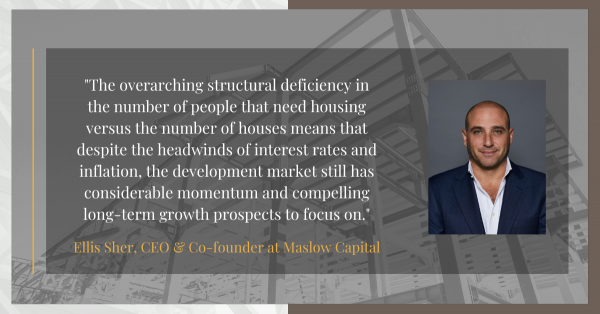UK interest rate rise: Our thoughts
Today’s announcement that the BoE will be raising the base rate by 50 basis points came as little surprise. In fact, we believe the BoE should have increased rates by 75 – 100 points to show the markets they are very serious about trying to contain inflation. With that said, the main contributors to inflation (energy prices and food), are essential goods, where demand is hard to moderate and make interest rate increases less effective.
Given the excessive demand v supply that is present in a number of core industries, our view is that inflation moderation is better delivered via enlarged factory output, regional stability and a shift away from zero Covid strategies as opposed to blunt interest rate hikes that will make life a lot harder for many people.
In the context of property and specifically property development, you might expect us to talk things up. The truth is that it is not easy out there. We are seeing more schemes going back into planning as existing permissions simply don’t deliver the economics necessary to attract equity along with more land banking. This is only further exasperating the supply of new housing.
We started Maslow during the GFC downturn, and have supported our developers across numerous shock events such as Brexit and Covid, ensuring we helped fund the supply chain and sub-contractors which ultimately led to very little Covid-induced delays in achieving PC on our schemes. As we navigate the challenges of this higher cost and higher interest rate world, you can be rest assured that we will continue to be cool-headed, highly pragmatic and supportive of the schemes and property entrepreneurs we partner with.
Whilst the market is challenging on one level, we have been pleasantly surprised by the sales rates on existing schemes and the increasing number and size of PRS/BTR, Co-Living, PBSA and specialist care and retirement schemes that are being driven forward. The view being taken here is that real estate is a very long-term asset and there will always be challenges along the way, but history shows us that what is expensive today is cheap tomorrow.
The overarching structural deficiency in the number of people that need housing versus the number of available houses means that despite the headwinds of interest rates and inflation, it’s still a market with considerable momentum and compelling long-term growth prospects.
We continue to invest heavily in new developments, supporting highly capable developers undertaking schemes that we believe will be successful over the near and long term.
As with the past, you can expect us to be assisting and working with our clients all the way through to the successful realisation of their projects.




